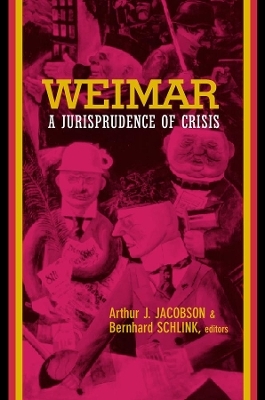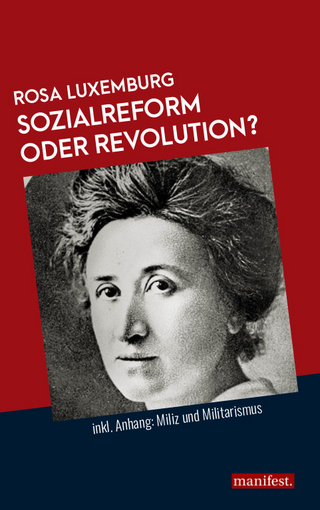
Weimar
University of California Press (Verlag)
978-0-520-23681-3 (ISBN)
- Lieferbar (Termin unbekannt)
- Versandkostenfrei innerhalb Deutschlands
- Auch auf Rechnung
- Verfügbarkeit in der Filiale vor Ort prüfen
- Artikel merken
This selection of the major works of constitutional theory during the Weimar period reflects the reactions of legal scholars to a state in permanent crisis, a society in which all bets were off. Yet the Weimar Republic's brief experiment in constitutionalism laid the groundwork for the postwar Federal Republic, and today its lessons can be of use to states throughout the world. Weimar legal theory is a key to understanding the experience of nations turning from traditional, religious, or command-and-control forms of legitimation to the rule of law. Only two of these authors, Hans Kelsen and Carl Schmitt, have been published to any extent in English, but they and the others whose writings are translated here played key roles in the political and constitutional struggles of the Weimar Republic. Critical introductions to all the theorists and commentaries on their works have been provided by experts from Austria, Canada, Germany, and the United States. In their general introduction, the editors place the Weimar debate in the context of the history and politics of the Weimar Republic and the struggle for constitutionalism in Germany.
This critical scrutiny of the Weimar jurisprudence of crisis offers an invaluable overview of the perils and promise of constitutional development in states that lack an entrenched tradition of constitutionalism.
Arthur J. Jacobson is Max Freund Professor of Litigation and Advocacy at the Benjamin N. Cardozo School of Law, Yeshiva University, and coauthor of The Longest Night: Polemics and Perspectives on Election 2000 (California, 2002). Bernhard Schlink is Professor of Public Law and Legal Philosophy at Humboldt Universitat zu Berlin. His novel, The Reader (trans. 1999), has won critical acclaim in German and in English.
Preface Translation and Apparatus Introduction. Constitutional Crisis: The German and the American Experience, by Arthur J. Jacobson and Bernhard Schlink Prologue. The Shattering of Methods in Late Wilhelmine Germany Introduction, by Stefan Korioth On Legal Theory and Sociology (1911), by Max Weber Constitutional Amendment and Constitutional Transformation (1906), by Georg Jellinek On the Borders between Legal and Sociological Method (1911), by Hans Kelsen Statute and Judgment (1912), by Carl Schmitt 1. Hans Kelsen Introduction, by Clemens Jabloner Legal Formalism and the Pure Theory of Law (1929), by Hans Kelsen On the Essence and Value of Democracy (1929), by Hans Kelsen 2. Hugo Preuss Introduction, by Christoph Schoenberger The Significance of the Democratic Republic for the Idea of Social Justice (1925), by Hugo Preuss 3. Gerhard Anschutz Introduction, by Walter Pauly Three Guiding Principles of the Weimar Constitution (1922), by Gerhard Anschutz 4. Richard Thoma Introduction, by Peter C. Caldwell The Reich as a Democracy (1930), by Richard Thoma 5. Heinrich Triepel Introduction, by Ralf Poscher Law of the State and Politics (1926), by Heinrich Triepel 6. Erich Kaufmann Introduction, by Stephen Cloyd On the Problem of People's Will (1931), by Erich Kaufmann 7. Rudolf Smend Introduction, by Stefan Korioth Constitution and Constitutional Law (1928), by Rudolf Smend 8. Hermann Heller Introduction, by David Dyzenhaus Political Democracy and Social Homogeneity (1928), by Hermann Heller The Essence and Structure of the State (1934), by Hermann Heller 9. Carl Schmitt Introduction, by Volker Neumann The Status Quo and the Peace (1925), by Carl Schmitt The Liberal Rule of Law (1928), by Carl Schmitt State Ethics and the Pluralist State (1930), by Carl Schmitt Epilogue. The Decline of Theory Introduction, by Reinhard Mehring The Total State (1933), by Ernst Forsthoff Legal Community as National Community (1935), by Reinhard H{od}hn The Constitution of Freedom (1935), by Carl Schmitt The Administration as Provider of Services (1938), by Ernst Forsthoff New Foundations of Administrative Law (1934), by Theodor Maunz Administration (1937), by Theodor Maunz Constitution (1937), by Ernst Rudolf Huber Form and Structure of the Reich (1941), by Ernst Rudolf Huber "Positions and Concepts": A Debate with Carl Schmitt (1941), by Ernst Rudolf Huber Reich, Sphere of Influence, Great Power (1942), by Reinhard Hohn Notes Editors and Contributors Copyright Acknowledgments Index
| Erscheint lt. Verlag | 21.10.2002 |
|---|---|
| Reihe/Serie | Philosophy, Social Theory, and the Rule of Law ; 8 |
| Verlagsort | Berkerley |
| Sprache | englisch |
| Maße | 152 x 229 mm |
| Gewicht | 635 g |
| Themenwelt | Recht / Steuern ► Allgemeines / Lexika |
| Recht / Steuern ► EU / Internationales Recht | |
| Recht / Steuern ► Öffentliches Recht | |
| Sozialwissenschaften ► Politik / Verwaltung ► Politische Theorie | |
| ISBN-10 | 0-520-23681-5 / 0520236815 |
| ISBN-13 | 978-0-520-23681-3 / 9780520236813 |
| Zustand | Neuware |
| Haben Sie eine Frage zum Produkt? |
aus dem Bereich


